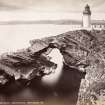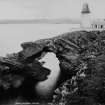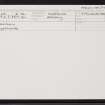Bressay, Kirkabister Ness, Lighthouse
Lighthouse (19th Century)
Site Name Bressay, Kirkabister Ness, Lighthouse
Classification Lighthouse (19th Century)
Alternative Name(s) 'Bressay Light'
Canmore ID 971
Site Number HU43NE 8
NGR HU 48923 37593
Datum OSGB36 - NGR
Permalink http://canmore.org.uk/site/971
- Council Shetland Islands
- Parish Bressay
- Former Region Shetland Islands Area
- Former District Shetland
- Former County Shetland
HU43NE 8.00 48923 37593
HU43NE 8.00 HU 48921 37612 Keeper's Cottages
HU43NE 8.00 HU 48916 37640 Engine House
HU43NE 8.00 HU 48900 37658 Store
HU43NE 8.00 HU 48890 37661 Store
HU43NE 8.00 HU 48907 37600 Foghorn
(Location cited as HU 489 377). Bressay Lighthouse, built 1858 by engineers D and T Stevenson. A short circular-section tower with two blocks of keepers' houses.
J R Hume 1977.
Planned and built under the Act of 1853, this lighthouse was intended to guard the southern entrance into Lerwick Harbour. It was lit in 1858, and was listed for automation in 1979.
R W Munro 1979.
Construction (February 1856 - 31 August 1858)
Light established 1858.
K Allardyce 1998
Publication Account (1997)
Bressay is yet another island dominated by a hill named the Ward, suggesting that it was used in Norse times as a hill on which beacons might be lit to warn of enemy movements. The lighthouse guards the southern entrance to Bressay Sound in much the same way that the broch of Mousa to the south guarded Mousa Sound some two thousand years ago. The north end of the Sound is protected by the lighthouse on Easter Rova Head on the mainland north of Lerwick. Designed by David and Thomas Stevenson and built during 1856-8, the lighthouse tower has a corbelled parapet and a cupola lantern. There are two fine ranges of keepers' quarters, and the station was equipped with a fog horn.
The road ends at Kirkabister Ness, but from here it is possible to walk south-eastwards along the coast to the Bard, where a 6-inch gun on its mounting survives from the defences of the First World War (HU 516357 [ HU53NW 11]).
Information from ‘Exploring Scotland’s Heritage: Shetland' (1997).














